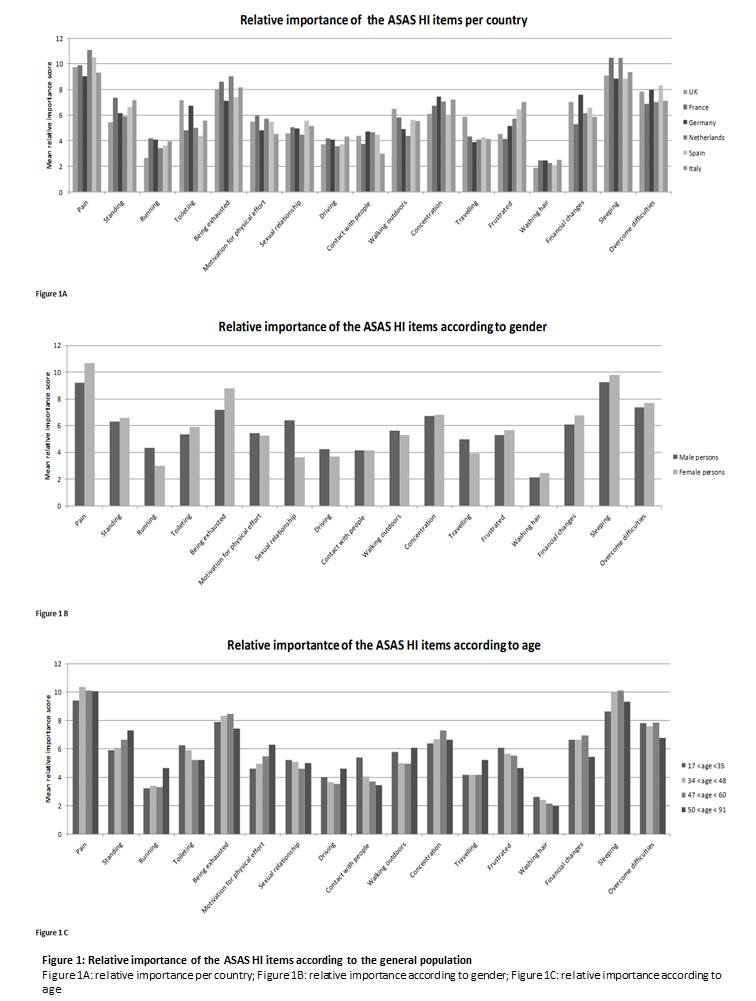Session Information
Date: Sunday, November 8, 2015
Session Type: ACR Concurrent Abstract Session
Session Time: 4:30PM-6:00PM
Background/Purpose:
The ASAS Health Index (HI) is a disease-specific questionnaire (QoL) for
patients with spondyloarthritis (SpA) aiming to measure functioning and health. The ASAS HI can serve as
a starting point to develop a disease-specific utility reflecting the value or
preference for health states specific for patients with SpA. Although it is
important to measure health utility from the perspective of the patient, it is
recommended worldwide to base decisions about resource allocation on utilities
representing the perspective of the general population. In a first step towards
a disease specific utility for the societal perspective, it is necessary to
know which of the 17 aspects of health impairments included in the ASAS HI have
the most influence on health according to subjects from general population and
to understand whether there are differences in ratings among European
countries.
Methods:
An online survey was performed to conduct a best-worst experiment (BWS) based
on the items of the ASAS HI in a random sample of persons from the general
population from the UK, France, Germany, the Netherlands, Spain and Italy. In
the BWS experiment, persons answered 17 choice
tasks, each consisting each time of 4 different items of the ASAS HI. In each
task, persons had to indicate which item they considered the most important and
the least important for functioning and health. The mean relative
importance for each item of the ASAS HI could then be generated using the
estimated hierarchical Bayes method.
Differences in subgroups by country, gender and age were explored. Construction
of the tasks and data-analysis were performed using the Sawtooth software.
Results:
In total, 3,039
(around 500/country) persons from the general population (age 46.5 years (SD
15.2), 1556 women (52.2%)) contributed to the analysis. The 5 most important aspects
were pain (9.97, 95%-CI 9.79 to 10.14), sleeping (9.50, 95%-CI 9.31 to 9.69),
being exhausted (8.03, 95%-CI 7.88 to 8.19),
overcome difficulties (7.55, 95%-CI 7.39 to 7.70), and being able to concentrate
(6.78, 95%-CI 6.63 to 6.93). The 5 least important items were washing hair
(2.28, 95%-CI 2.18 to 2.39), running (3.65, 95-CI 3.50 to 3.80), driving (3.94,
95%-CI 3.80 to 4.08), contact with people (4.16, 95%-CI 4.02 to 4.29), and
travelling (4.42, 95-CI 4.29 to 4.56).
Figure 1 shows results and illustrates the consistency of findings across
countries, age-categories and sex.
Conclusion: This study provides information of
the relative impact of the items of the ASAS HI on overall health from the
societal perspective. The general population states that pain, sleeping problems
and being exhausted are the most important aspects of SpA that influence
functioning and health. The results were comparable across sex, age and
countries. This study is the first step towards a disease specific utility for
health in SpA.
To cite this abstract in AMA style:
Essers I, Hiligsmann M, Kiltz U, Bansback N, Braun J, van der Heijde D, Boonen A. The View of Healthy Persons on the Impact of Spondyloarthritis on Functioning and Health: Results of a Best-Worst Scaling Based on the ASAS Health Index [abstract]. Arthritis Rheumatol. 2015; 67 (suppl 10). https://acrabstracts.org/abstract/the-view-of-healthy-persons-on-the-impact-of-spondyloarthritis-on-functioning-and-health-results-of-a-best-worst-scaling-based-on-the-asas-health-index/. Accessed .« Back to 2015 ACR/ARHP Annual Meeting
ACR Meeting Abstracts - https://acrabstracts.org/abstract/the-view-of-healthy-persons-on-the-impact-of-spondyloarthritis-on-functioning-and-health-results-of-a-best-worst-scaling-based-on-the-asas-health-index/

